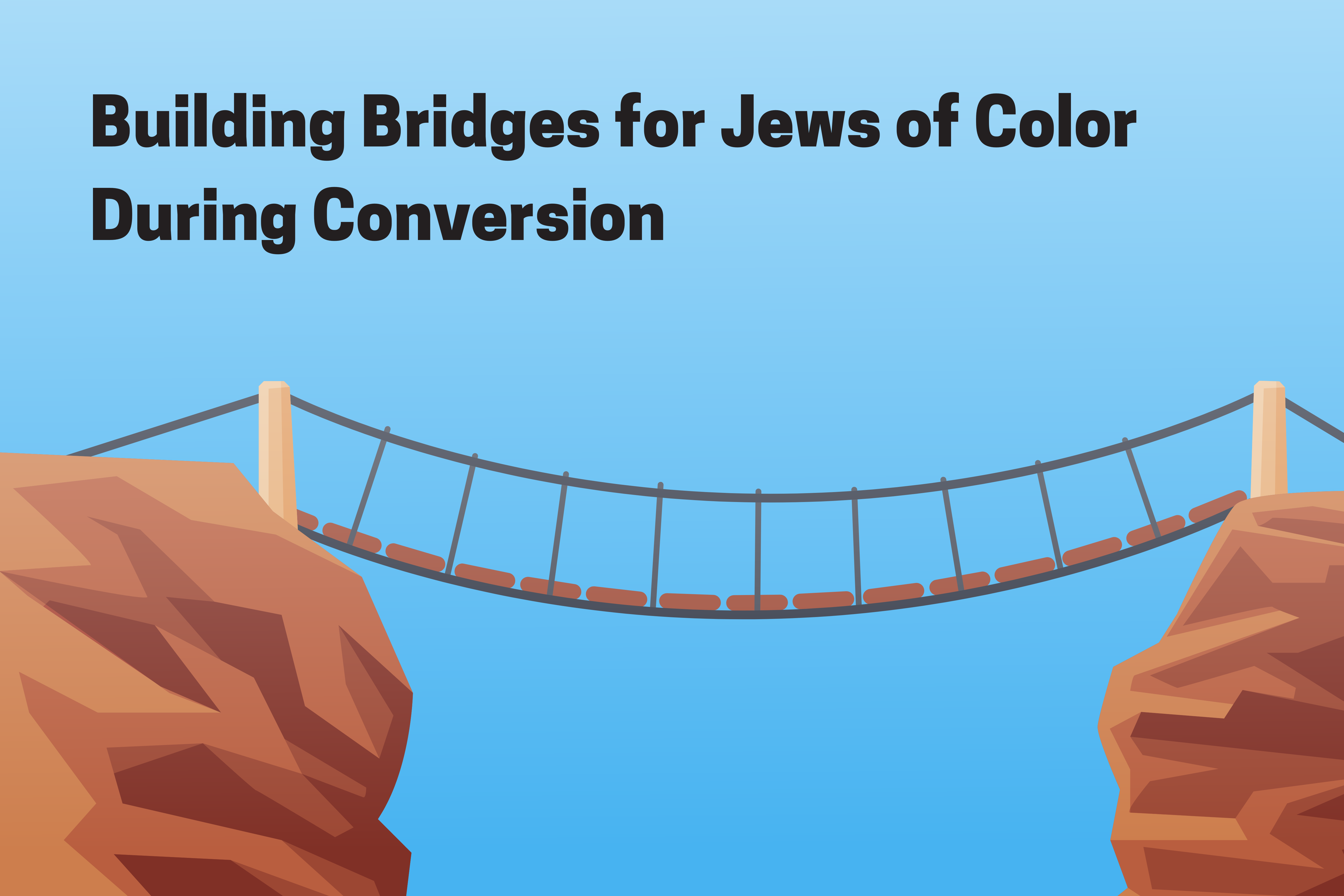
“People have all sorts of questions as they step into the unknown,” said Jill Housen, the Diversity, Equity, Inclusion, and Belonging consultant at Sandra Caplan Community Bet Din (SCCBD). For the last two years, Housen has held this role at SCCBD, the largest trans-denominational beit din in California. Before then, she mentored Black, Indigenous, and People of Color (BIPOC) who were in the process of converting to Judaism. Housen knows that BIPOC who convert to Judaism face additional barriers and has advocated for belonging and community retention through authentic connection and mentorship.
“The process of conversion across the board is very anxiety-ridden. When you’re someone who doesn’t ‘look like’ what people often think a Jew ‘should’ look like, there’s a whole other layer of anxiety and concern that goes along with becoming part of the community.” Housen says that during the conversion process, there is a need for acknowledging the realities of being a Jew of Color in a predominantly white, Ashkenazi U.S. Jewish community.
Housen explains that for most Jews of Color, whether they have converted or were raised Jewish, there are many times when they are the only BIPOC person in a Jewish space, and that they are likely to encounter bias and racism. The major study, Beyond the Count: Perspectives and Lived Experiences of Jews of Color, found that 80% of participants who were self-identified Jews of Color have experienced discrimination in Jewish settings. While this statistic is unsettling, Housen knows that this is a fact that is better shared proactively rather than after someone has experienced racism.
For some BIPOC, the conversion process itself can amplify feelings of otherness that are rooted in the racism they have already encountered in Jewish contexts. Because Jews of Color are often pressured to prove their belonging in the Jewish community, preparation for speaking with the bet din—the rabbinic court that assesses the conversion—can hit a nerve that has already been over-exposed.
“Lots of people want to know what’s going to happen when they go before the bet din,” says Housen. “They want to know, will their racial identity be talked about, do they need to know every answer about the Torah—these are questions that, as People of Color, we get asked a lot in our everyday life in the Jewish community. We’re quizzed about Torah (‘just how Jewish are you?’), we have to constantly be re-legitimizing ourselves. So, preparing for the conversation with the bet din brings out a different set of concerns over these questions than white people who are going through the process.”
Without addressing the challenges that Jews of Color will face, Housen argues, BIPOC who are converting are more likely to disconnect from the Jewish community. “This is what happens,” she explains. “You join [a synagogue], you go, and something happens, unfortunately. And then you stop going.” Housen knows that she can’t eliminate racism and bias in the Jewish community, but she is also hopeful that there are ways community-building and connection among BIPOC in the community can mitigate the isolation that racism causes.
“If we can build these bridges, these strong communities, where people know they have a place and belong, then we have retention.”
After volunteering to support community connection among BIPOC who were in the conversion process, Housen advocated for a paid consultant position to develop a formal mentorship program that connects those who are converting to JoC mentors in the community. Housen’s program currently has seven mentor-mentee pairs, which she oversees to gain insights into the needs of those who are seeking to join the community.
One of the goals of the mentoring program is for mentors to take learnings from the field back to their respective communities and congregations, leading conversations and processes to create belonging. “What I always want to know is what the mentors are hearing. What are their concerns as mentors? Is there a common thread? What are the top concerns of BIPOC folks converting to Judaism, and how can we help address those to meet the needs of BIPOC in the conversion process?”
Housen also helps people converting build friendships and connections in the Jewish community that aren’t tethered to Jewish institutions. “There are a lot of ways Jews build community outside of an institutional community. Even if there’s just one person you connect with and build a friendship with, you can build the community you need.”
But mentorship and connection are only part of the solution, Housen says. “We need people who look like us in leadership positions. Representation is important.” Housen has begun to imagine what it might look like to implement mentoring programs nation-wide, as well as how mentor-mentee relationships might be able to support pipelines for local leadership roles.
“There is simultaneous work that needs to be done,” Housen states. “We’re focusing right now on making people feel like leadership is possible for Jews of Color. That’s powerful, and we can create this warm welcoming environment for ourselves, but we also don’t need to be delivering people into toxic environments.” Housen says that if change is to be made, congregations and other communities must actively take part in deconstructing the racism that exists in their community and the Jewish community writ large.
Through the creation of this mentorship program, Housen has seen first-hand how connecting with BIPOC in the Jewish community can be healing. She hopes to create that experience for others. “I feel like I’m being fed. This is work I’m doing for my people. I love being around other Jews of Color, I love giving back to my community. It’s everything for me. It’s very meaningful in my life.”


